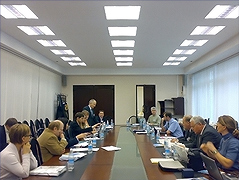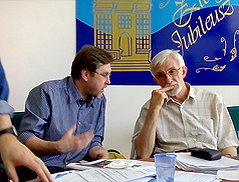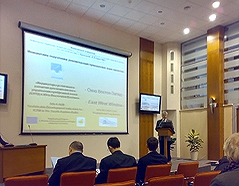Working Package 3
Working Group on sea use planning and ICZM
The work of the Working Group 3 (WG3) resulted with the elaborated concept of sea use planning in the BSR. This required first of all elaboration of the vision for long term development of the Baltic Sea space, a as well as principles and priorities upon which such vision can bee implemented. Afterwards the system of joint sea planning and management can be established using new governance methods and adequate tools. Principles have been already elaborated by EU Interreg IIIB Baltcoast project.
WG3 focused on NW Russian perspective in transnational sea use planning and Integrated Coastal Zone Management (ICZM). Through the exchange of experience and good practice the WG3 allowed for contribution of NW Russia to an integrated approach on BSR-wide sea use planning and ICZM policies and methodology. It had a truly innovative approach, hardly tested anywhere in the world. The pilot action in the Gdansk Bay aimed at practical implementation of Baltcoast recommendations on the Russian-Polish border by means of a common marine resources plan and proposals for institutional adjustments.
WG3 had three distinct types of activities, and each of them yielded respective outputs:
The leading country of the WG2 was Finland with Latvia as a co-chair of the Group. Senior civil servants from Germany, Sweden, Poland, Latvia and Lithuania took part at the meetings as well as experts delegated and financed by VASAB countries or the project.
Working Group on sea use planning and ICZM
The work of the Working Group 3 (WG3) resulted with the elaborated concept of sea use planning in the BSR. This required first of all elaboration of the vision for long term development of the Baltic Sea space, a as well as principles and priorities upon which such vision can bee implemented. Afterwards the system of joint sea planning and management can be established using new governance methods and adequate tools. Principles have been already elaborated by EU Interreg IIIB Baltcoast project.
WG3 focused on NW Russian perspective in transnational sea use planning and Integrated Coastal Zone Management (ICZM). Through the exchange of experience and good practice the WG3 allowed for contribution of NW Russia to an integrated approach on BSR-wide sea use planning and ICZM policies and methodology. It had a truly innovative approach, hardly tested anywhere in the world. The pilot action in the Gdansk Bay aimed at practical implementation of Baltcoast recommendations on the Russian-Polish border by means of a common marine resources plan and proposals for institutional adjustments.
WG3 had three distinct types of activities, and each of them yielded respective outputs:
- The present situation, development trends and political objectives in the fields described above as well as their consequences for transport and business development were explored ("overview"). In order to cover the missing information, the expertise work also addressed the transport network in Belarus as a part of the BSR transport system.
- Recommendations to improve the situation from the viewpoint of economic and territorial integration of the BSR were formulated ("recommendation paper").
- Fields for further concrete actions were identified and concrete measures prepared for implementation ("action plan with pilot investments").
The leading country of the WG2 was Finland with Latvia as a co-chair of the Group. Senior civil servants from Germany, Sweden, Poland, Latvia and Lithuania took part at the meetings as well as experts delegated and financed by VASAB countries or the project.


